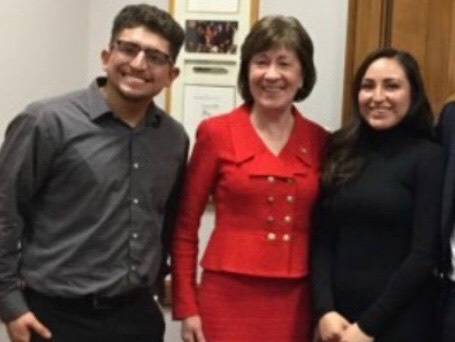I grew up in Portland, and I love the smell and feel of the ocean. I feel lucky to live among neighbors who look out for each other. Someday, I dream of joining the U.S. military and serving this country. But I worry I’m about to lose this place, my friends and family and all my dreams.
I’m in the Deferred Action for Childhood Arrivals program, which gives young undocumented immigrants who came here as children temporary permission to work and live in the United States.
President Trump ended DACA a few months ago. If Congress doesn’t create a path to citizenship for “dreamers,” I could be deported. So I’m asking Sen. Susan Collins to act now to keep me – and other young people with DACA across Maine – here in our home. Please do everything in your power to make sure Congress passes the bipartisan Dream Act.
I was born in San Salvador, El Salvador. My father was a farmworker whose hard labor bought us a nice house. But gangs were taking over the city and our neighbors were killed. When gang members started to threaten us for money, my parents decided to run.
I was 3 years old when we arrived in Portland, where my mom had U.S. citizen relatives. My memories start here. I remember the first time I touched snow, and how I loved recess in kindergarten.
When you come to a new country so young, you don’t need to think about it much, you just start talking the language. By first grade, I was speaking English, and at home I’d forget Spanish words.
As I grew up, I forgot that I hadn’t been born here. My parents never talked about El Salvador – the terror they had felt there was traumatizing and they didn’t want it to affect me. The most important thing to them was for me to feel safe.
Every morning I stood, put my right hand on my heart and pledged allegiance to the flag. At Deering High School, I ran track and played varsity lacrosse and soccer. I loved being part of a team and feeling like we were all in something together.
I had no idea I was undocumented until I applied for a job at Wendy’s when I was 15. The manager asked if I had the right documents, and I said, “I think so.” When I asked my mother, she said that I had none of those documents, and it went far beyond Wendy’s — I wouldn’t be able to drive and might not be able to go to college.
I was shocked and devastated. I lost my sense of purpose. For the first time, I felt isolated because I didn’t want to tell anyone.
That was the winter of 2012. By June, DACA was created, and I applied. I felt so incredibly relieved to have this little card that kept me safe from deportation and able to work. I got that job at Wendy’s and stayed for three years, and I started trying in school.
I had always wanted to serve this country that gave me so much. But when the military recruiter set up outside my high school cafeteria, he told me I didn’t qualify to join. He did allow me to do physical training with the Marine recruits. For a while, I went regularly to the park by the South Portland recruiting station. There I carried ammo cans, ran for miles, did pushups and jumping jacks and hoped that somehow something would change.
Finally, I told the staff sergeant I couldn’t keep coming because it hurt too much to be excluded.
Eventually, I was accepted to college at Maine Maritime Academy, but I couldn’t afford to attend because I wasn’t eligible for financial aid.
I now work as a tax preparer, but I haven’t forgotten my dreams. I want so badly to serve in the Marines and I’m still hoping for that opportunity. Someday I hope to go to college.
I would like to tell Sen. Collins: Please find a real solution for people like me. Maine is small, but there are 100 of us in the DACA program here, working hard and contributing to our communities. This legislation would impact almost 1 million dreamers across America. We want nothing more than to stay in our home. You can make that happen. You hold our fate in your hands.
Christian Castaneda is a resident of Portland.
Send questions/comments to the editors.


